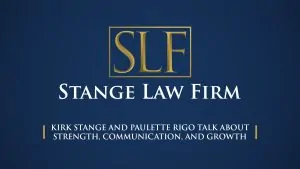Divorce and real estate issues are among the most complex in family law. Because real estate is usually the highest-value property in a couple’s estate, if they divorce, it can easily turn into a lengthy legal dispute.
Even if you’re on good terms with your ex, having an experienced attorney on your side during property division is vital to protecting your rights. They’ll be able to help you understand expectations for the outcome of your unique case. Here at Stange Law Firm, PC, we prioritize the well-being of our clients and their families during the entirety of the case.
Experienced Divorce and Family Law Attorneys
Founded in 2007, Stange Law Firm, PC, has established a multi-state firm focusing on family law. Our attorneys serve clients with legal matters involving divorce, property division, and disputes. We understand how difficult family transitions can be and how critical it is to preserve your financial future during divorce.
Clients who work with Stange Law Firm, PC have instant access to case management tools, such as Your Case Tracker, along with direct contact information for their attorney. Our firm focuses on family law, tailoring our legal approach to your unique needs and desires.
Laws Surrounding Divorce and Real Estate Property Division
As of 2023, in the United States, 2.4 per 1,000 people are divorced. Divorce can be a lengthy process, and disputes over shared property can exacerbate the stress and increase the cost. Understanding your state’s specific laws surrounding property division and divorce is vital. When a couple divorces, many states dictate that all marital property will be divided fairly, although it is not necessarily divided 50/50.
Marital property generally includes anything either spouse acquired during the marriage, even if it’s only in one person’s name. In most divorces, only marital property is divided. Examples of marital property include:
- The marital home
- Real estate
- Investment properties
- Any value increase from joint improvements to separate property.
- Bank accounts and retirement accounts
- Vehicles, boats, furniture, and appliances
In the United States, the average home value is $367,969. Real estate owned by one spouse before the marriage is generally considered separate property and not divided in divorce. However, if marital funds were used to pay the mortgage, make improvements, or increase the property’s value, part of that increase could be treated as marital and subject to division.
Keeping records of when the property was bought, who paid for it, and how it was used during the marriage is essential. If both spouses are on the title, or if the home was used as the family residence, the court will likely treat it as marital property.
The Benefits of a Prenup and Postnup
Having a legally valid prenuptial or postnuptial agreement in place can also help the process of dividing real estate and other property during divorce. These agreements are contracts that help couples protect their assets in case of divorce.
A prenuptial agreement is made before marriage, while a postnuptial agreement is created after the couple is already married. Both types can outline how property will be handled in the event of a divorce or separation. If the agreement is signed voluntarily and is not unfairly one-sided, many states will recognize it during divorce proceedings, making the process more streamlined.
Because each marriage and divorce is unique to the couple, outlining your property in a pre- or postnuptial agreement can help divide your assets according to your wishes as a couple. If you can’t agree, the court will generally make the final decision based on what it finds to be fair.
State courts won’t be able to fully factor in your feelings and relationship with your ex during divorce proceedings. Having an attorney on your side to help represent your interests is crucial to making sure property division is fair and according to both of your wishes.
Why Choose Us?
Stange Law Firm, PC has extensive experience handling real estate divisions in divorce cases across multiple states. Each case is evaluated based on current state law and the client’s financial position and personal wishes.
Our founding partner, Kirk Stange, received recognition from the Missouri Bar in 2017 for his significant role in providing continuing legal education to attorneys across the state. With guidance from him and other partners across various states, our attorneys have helped our clients achieve optimal outcomes for their cases.
FAQs
Q: How Do You Fairly Split Assets in Divorce?
A: In a divorce, marital assets are typically divided through equitable distribution. Courts first identify which assets are marital and which are separate property. To divide marital property, the court will factor in each spouse’s:
- Financial situation
- Contributions
- Custody arrangements
- Conduct during the marriage
Couples can negotiate property division and submit it to the court, but if they cannot agree, the court decides.
Q: How Do Couples Split the House in a Divorce?
A: Couples generally have only a few options for dividing the home during divorce. They can sell the house and split the proceeds. If both parties agree, they can co-own the home temporarily with a plan to sell later. This is usually done for the sake of stability in the children’s lives. One spouse may buy out the other’s share by paying an agreed amount.
Q: Can Property Division Be Modified Later?
A: Property division in most divorce cases is generally final and cannot be modified after the judgment is entered. Exceptions are rare and typically only involve fraud or procedural errors discovered soon after the case closes. Wanting to make changes later on because of new laws or claims is typically not allowed by most states.
Q: What Happens if One Spouse Doesn’t Disclose Assets?
A: Sometimes, one spouse might hide assets on purpose to reduce what they have to share during divorce proceedings. Courts use a process called discovery to gather financial records, and they may hire professionals, such as forensic accountants, to uncover hidden assets. An experienced lawyer can provide valuable assistance during the discovery process.
Contacting a Trusted Multi-State Law Firm
Divorce and real estate claims require careful planning and knowledge of your state’s property law. The attorneys at Stange Law Firm, PC, assist clients across various states with dividing homes, land, and other real estate. Contact us today to schedule a confidential consultation and learn how we can help you move forward during your divorce.










